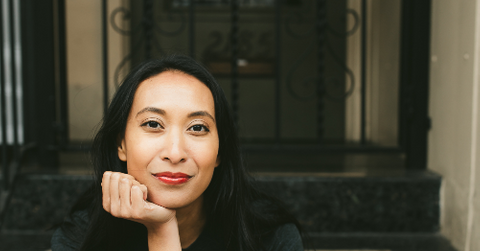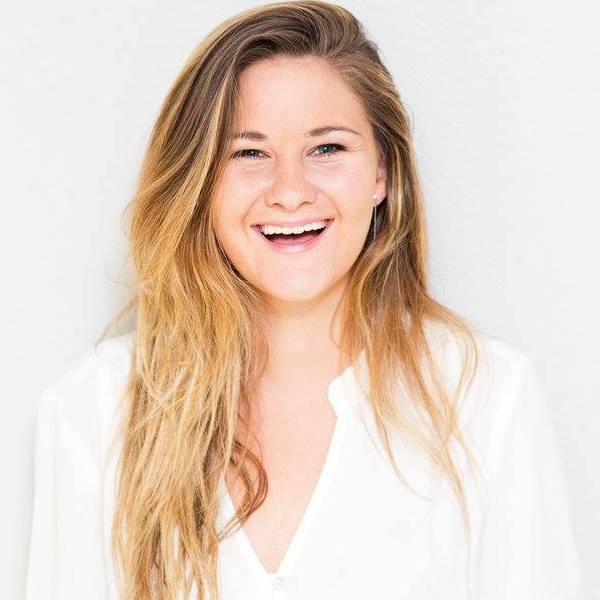Eliza Blank may have founded a multimillion-dollar business aimed at making houseplants more accessible to those not predisposed with a green thumb—but that doesn’t mean she hasn’t killed a few herself.
When she founded The Sill in 2012, Blank’s mission was to bridge the gap between people and plants. She wanted to demystify the idea that plant care is too complex for a generation who doesn’t have six hours to spend in their garden every Sunday. Which is what her mother did when Blank was growing up in Western Massachusetts.
Now living and working in New York City as a CEO, and a mother herself, Blank, like her ever-growing community of plant parents, “doesn’t spend six hours consecutively doing anything.”
The woman behind your favorite greenery posts on Instagram recently sat down with Her Agenda to talk entrepreneurship, staying motivated, and the self-care in plant care.
Her Agenda: How did the idea for The Sill begin? Have you always been a houseplant enthusiast?
Eliza Blank: My mother is an avid gardener and I grew up around plants. But as a child, I took it for granted. To me, watering the garden felt like a chore. I didn’t really appreciate the impact that nature and plants had on me until I went to college and left all that behind.
I ended up going to New York City for school, and all of a sudden I just felt this tremendous disconnect to nature that I did not anticipate. My college roommate actually had a very similar experience being from Michigan, so we would find ourselves spending all of our weekends walking through some of the grittiest parts of Manhattan to Central Park just to have grass under our feet.
My mother is an avid gardener and I grew up around plants. But as a child, I took it for granted. To me, watering the garden felt like a chore. I didn’t really appreciate the impact that nature and plants had on me until I went to college and left all that behind
But I loved the dynamic quality of the city and I knew I wanted to stay, but in order to make it sustainable for myself emotionally, I needed to incorporate plants back into my life. However, there weren’t really nice consumer experiences for plants in New York. I was buying plants at Home Depot and Kmart, meanwhile, there are so many choices for everything else.
You can go into Bed, Bath & Beyond and there’s a thousand shower curtains. But there weren’t a lot of options for plants.
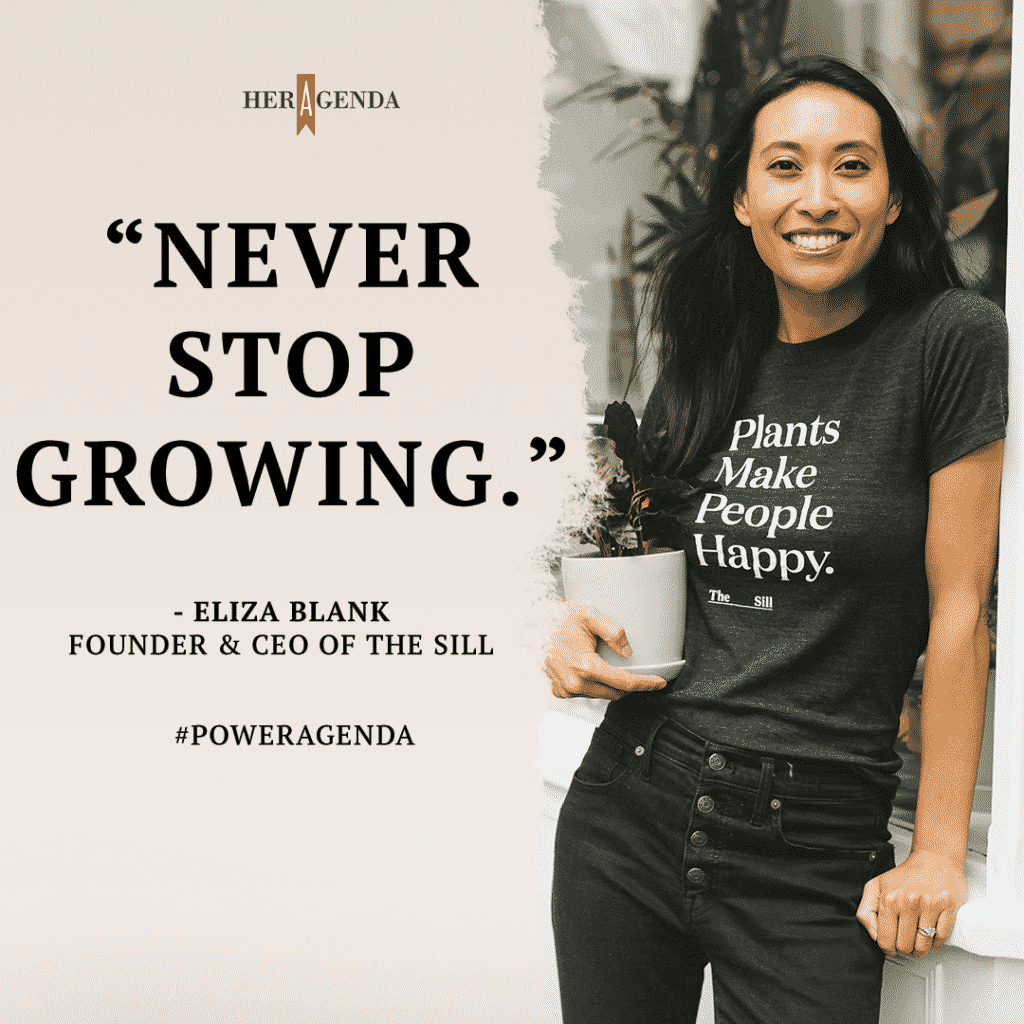
Her Agenda: One thing I love about The Sill is the education available for those who aren’t plant enthusiasts. Was that a part of your initial idea for The Sill?
Eliza Blank: It was. I watched my mother take care of plants my whole life, and I never really stopped to think how she learned how to take care of plants. So I thought it was this inherent thing that you just know how to do—and then I killed a lot of plants.
I realized that I knew nothing about plants beyond eighth-grade photosynthesis, so I started to wonder how I could start to learn. And again, I wished there was a brand or a resource that could sort of dumb it down, speak my language and make it approachable and fun. Everything I was finding was either on the depths of Internet forums, old gardening magazines, or literally calling my mother.
Another big difference in the plant education available was that my mother lives in a house in Western Massachusetts, and I was living in an apartment in New York City. So for her to give me advice about keeping the house plant alive didn’t help if my radiator was pumping dry heat straight into the winter. Apartment-friendly plant care clearly needed to be addressed.
Her Agenda: Well it definitely makes me feel better that you’ve also killed plants.
Eliza Blank: Everyone kills plants. If someone says they’ve never killed a plant, they’ve never owned a plant.
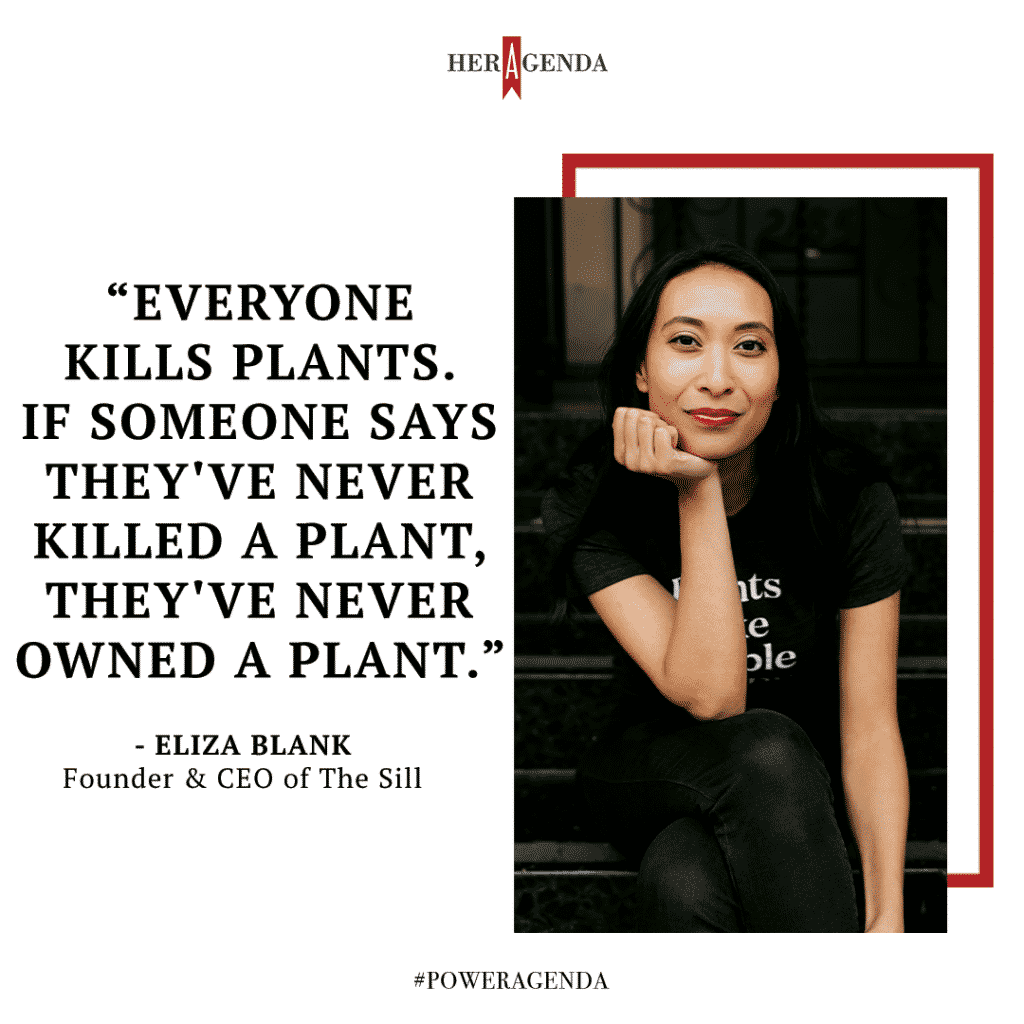
Her Agenda: Agreed. While some people may shy away from plant care for that reason, it felt like everyone became a plant parent last year. Do you think the COVID-19 pandemic led to more people bringing a bit of the outside world into their homes?
Eliza Blank: Yes, and what’s amazing about plants is that they can be something different to different people. They can be an element of your home decor, a hobby, something to learn about, something to practice. And it’s also a relationship. It’s something that you nurture and take care of.
-For so many different reasons, people turned to plants during COVID, and we felt so lucky to be in a position to actually do good during a challenging time.
We don’t expect every single customer of ours to be a plant expert, but they still need to learn how to take care of it and want to know what it’s called. For so many different reasons, people turned to plants during COVID, and we felt so lucky to be in a position to actually do good during a challenging time.
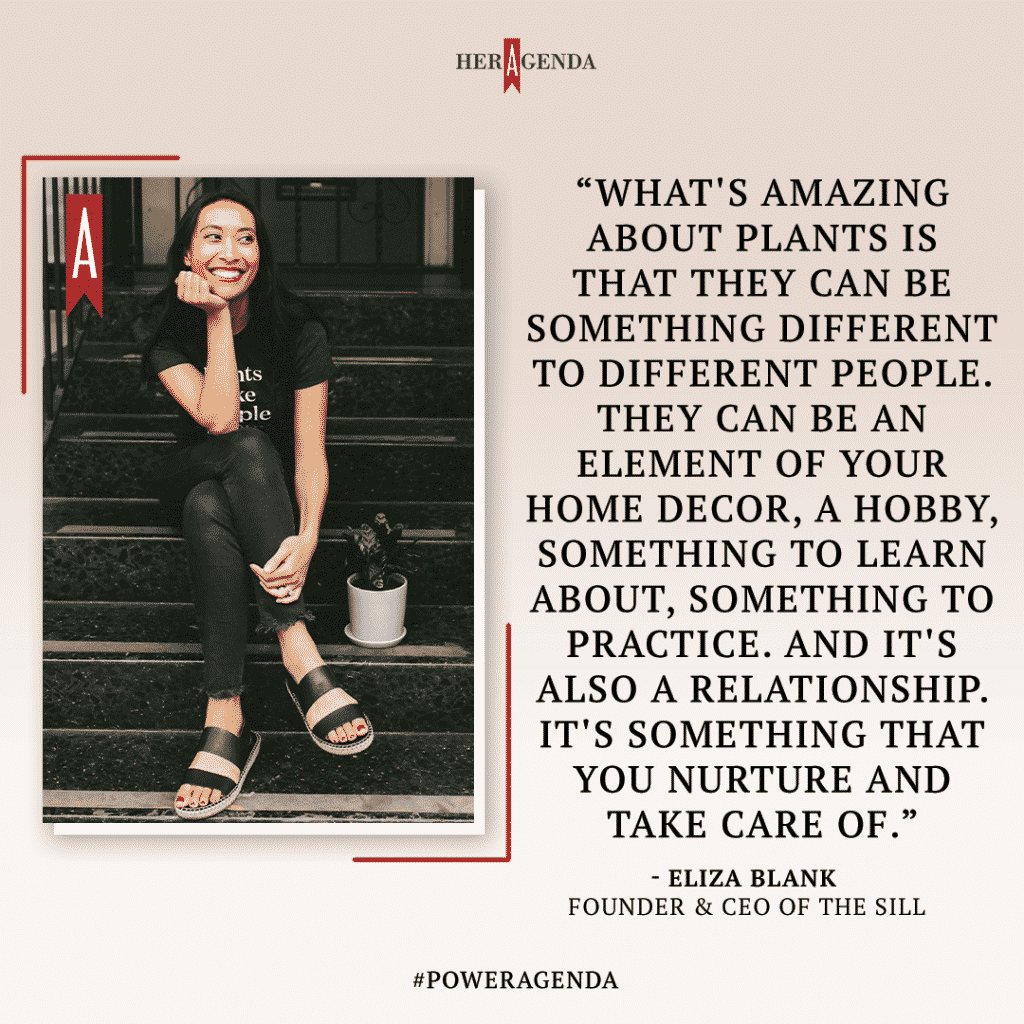
Her Agenda: Even prior to the pandemic, Millennials and Gen Z have an increased interest in plants. Where do you think that shift is coming from?
Eliza Blank: I’m an older millennial, and we’re kind of like the Tamagotchi generation. We want to take care of something, but we want it to have a low impact on our lives. I think we’re the first generation who delayed having kids for that reason—but that doesn’t mean we don’t have that nurturing element. That’s where plants come into play.
It’s a much lower commitment than pets or kids, and I think that’s a little bit of why millennials are attracted to them. But again, it’s a very different relationship than my mother has to her plants and gardening. So part of what The Sill was trying to solve was how to modernize plant care for a generation who just lives their lives so differently. My mother will spend six hours in her garden on a Sunday, and I don’t spend six hours consecutively doing anything, even if it’s like my favorite thing in the world.
So houseplants became a connection to nature that was a little bit more bite-sized, could fit into busy schedules and small apartments, and still really hold meaning. And I think what’s special about Millennials and Gen Z is they really do want to surround themselves with things that are meaningful.
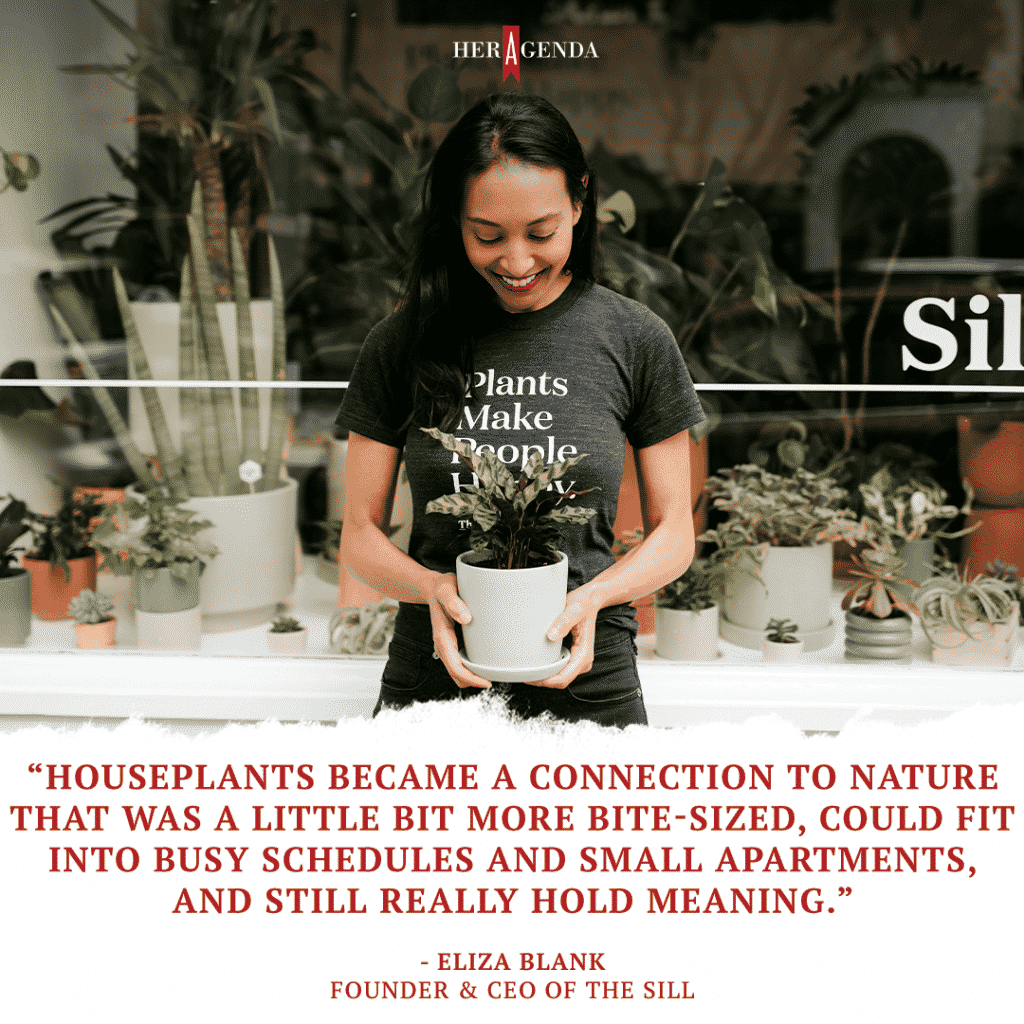
Her Agenda: Even though you’re an “older Millennial” now, you started The Sill when you were just 26. How have your ideas about entrepreneurship changed since?
Eliza Blank: I started this business when I was 26, and I’m going to be 36 this year. The majority of my adult life has been lived through this business. I’ve gotten married, I’ve had my first kid, and I think entrepreneurship at first was just this exciting adventure where I could make all these decisions for myself, not have a boss, and experience this sense of creative freedom.
And that is all still true, which is what keeps me excited and engaged in the business. But at the level that I’m at now, it’s so much more than just my individual freedom. It’s the responsibility for 80+ people, having to run a board of directors, trying to figure out what’s around the next corner as the entire macro environment of the world changes.
The challenges are just bigger but I think they’re satisfyingly bigger. What I get to tackle has exponentially grown in magnitude and significance. And entrepreneurship just offers growth in a way that most conventional careers can’t.
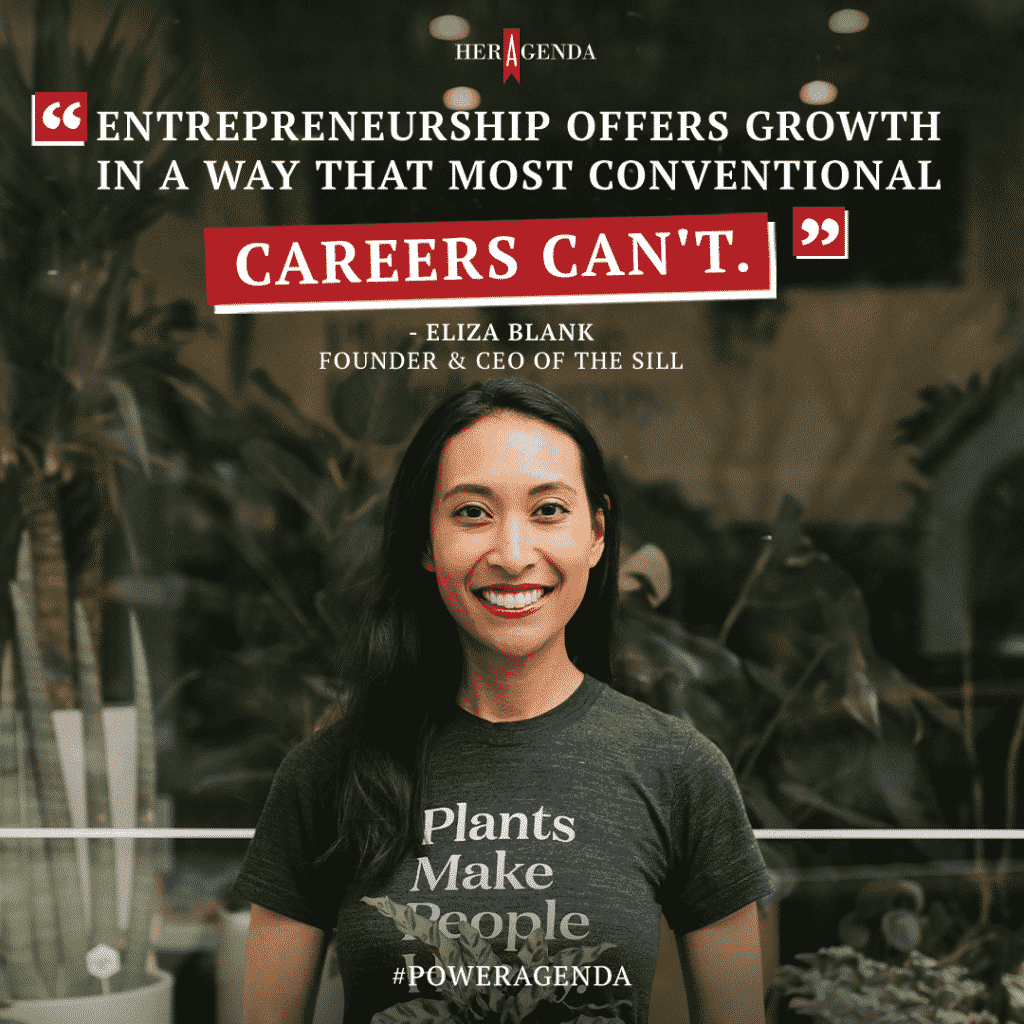
Her Agenda: I recently read an interview where you talked about how at the beginning of The Sill you were walking through plant shows and flower stands just asking questions about how it all worked. Do you think part of entrepreneurship is just learning as you go?
Eliza Blank: The good news is, now that I’m older, I realize that nobody has it figured out. Even people who have 30 years of experience still have to use their skills to apply whatever is happening today. Because whatever is happening today has never happened before.
So I think being an entrepreneur is getting really comfortable with the idea that you don’t have to know everything. That really puts you in a mindset of innovation and creativity, and it’s what allows you to do things differently. It puts you in a position to disrupt things.
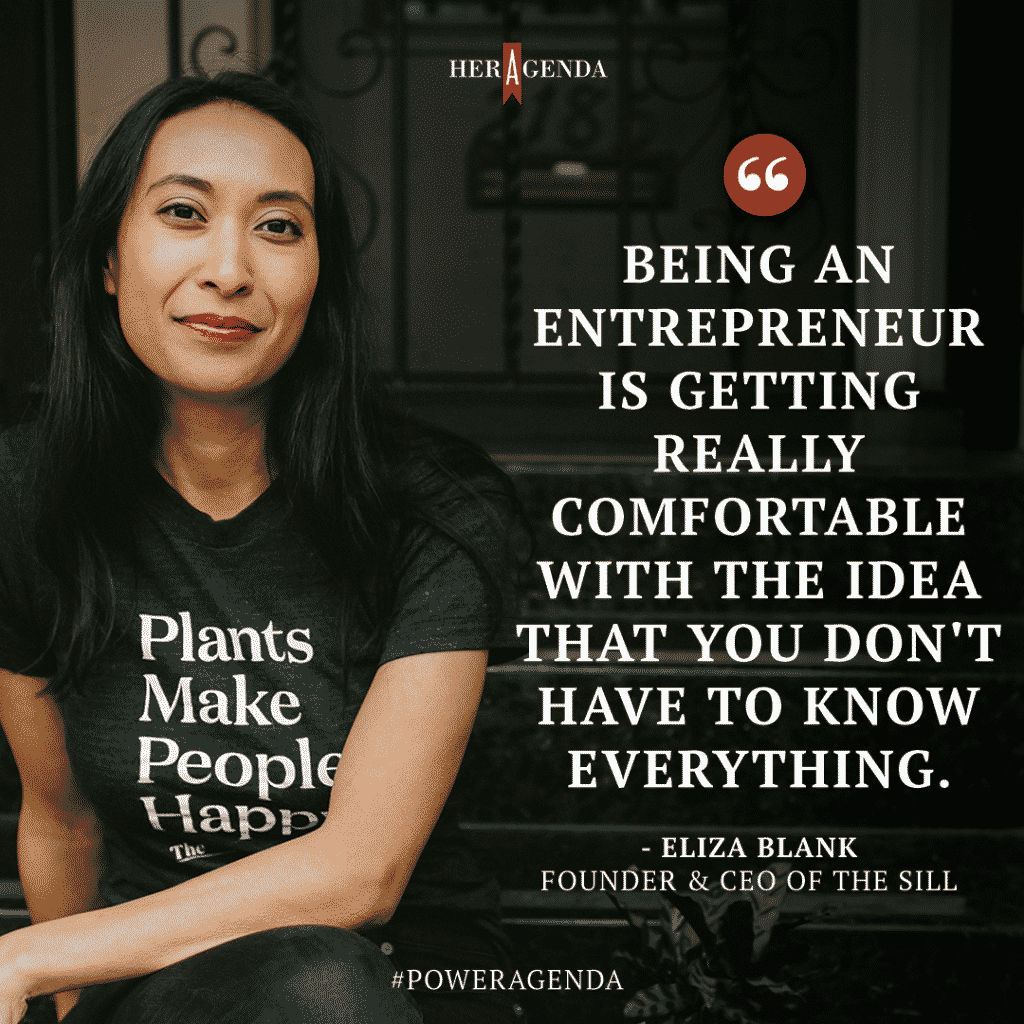
Her Agenda: What advice would you give to young women interested in entrepreneurship? What’s something you wish you knew when you started The Sill?
Eliza Blank: In retrospect, my experience leading up to starting The Sill was hugely valuable, and I don’t even know that I appreciated it at the time. I worked for a startup before starting one myself. It was a company called Living Proof, and it was incubated by a venture group outside of Boston. I had the opportunity to join them, really not appreciating the fact that they were a startup. It just was an entry-level marketing position at what I thought was a cool company.
It’s really in retrospect that I realize that going through that process was so foundational for me. There’s a lot of talented people who end up starting their businesses right out of college, but if you do have any hesitation around entrepreneurship, go find another small startup to work for. Maybe you’re not the founder or CEO, but you get to work very closely with the founding team and you’re going to learn so much so quickly.
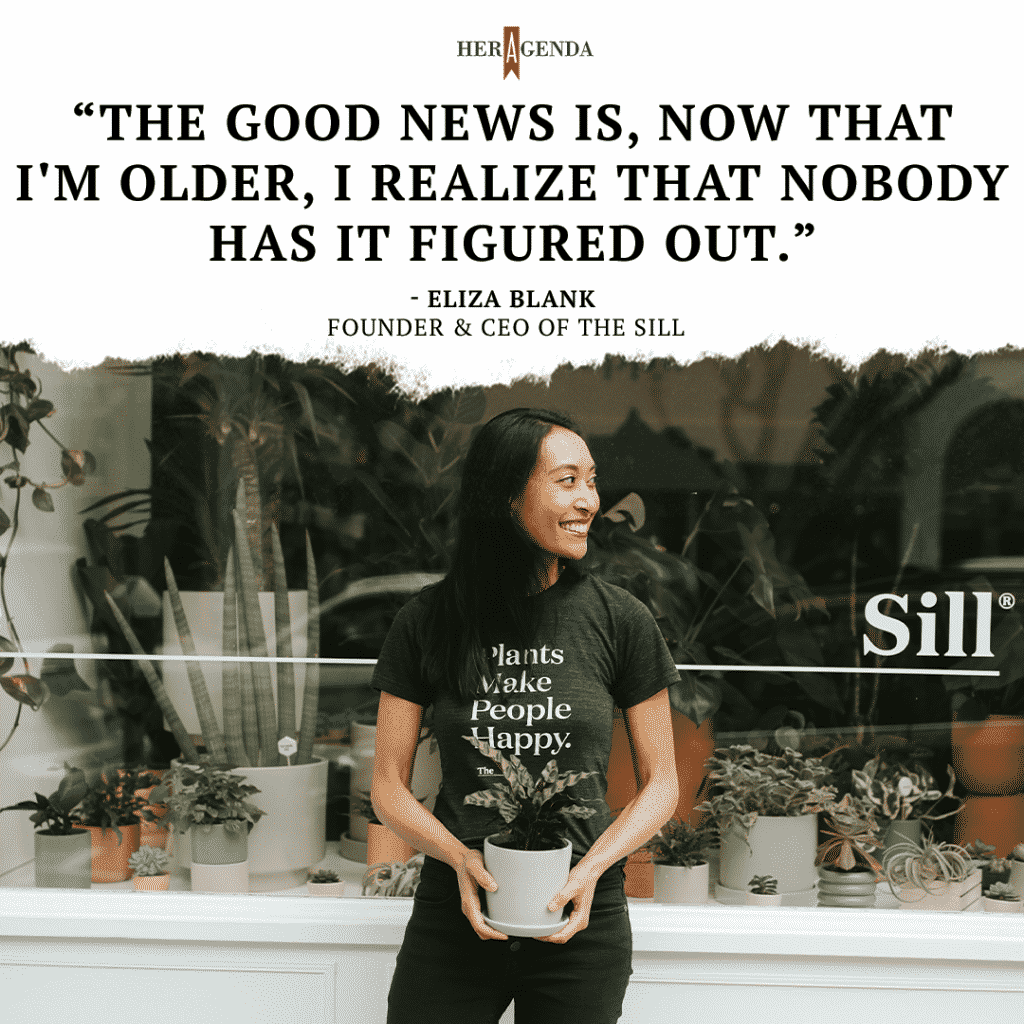
Her Agenda: There’s always so much talk about work-life balance, and the more we learn, the more nonexistent it seems to be. How do you deal with managing all of the different responsibilities in your life as a CEO, mother, and human trying to survive on this crazy planet?
Eliza Blank: With entrepreneurship, you have to stay out of the trap that it has to be a 24/7 grind. That’s not sustainable, and the upside to entrepreneurship is you should have control over your time. There’s nobody really telling me how to spend my time. I obviously have deliverables and I can easily become a bottleneck for people on my team, but if I need to take an hour to myself to exercise or spend time with my daughter, I can. Doing so is going to put me in a better headspace to do my work, and it’s my responsibility to actually do that.
I’ve gone through periods where I felt guilty if I wasn’t online 24/7 or available to the team or working on the business, because I felt like as the founder and CEO, I should be putting in the most hours over anyone to demonstrate my commitment. But it’s just not realistic to be able to work that much all the time. You burn out, start having fewer ideas, and end up being less committed.
-I’ve gone through periods where I felt guilty if I wasn’t online 24/7 or available to the team or working on the business, because I felt like as the founder and CEO, I should be putting in the most hours over anyone to demonstrate my commitment. But it’s just not realistic to be able to work that much all the time.
So I give myself the leeway to use my time as I really need it for knowing that it’s ultimately going to have the best payoff for the company. But, yeah, there’s no such thing as balance.
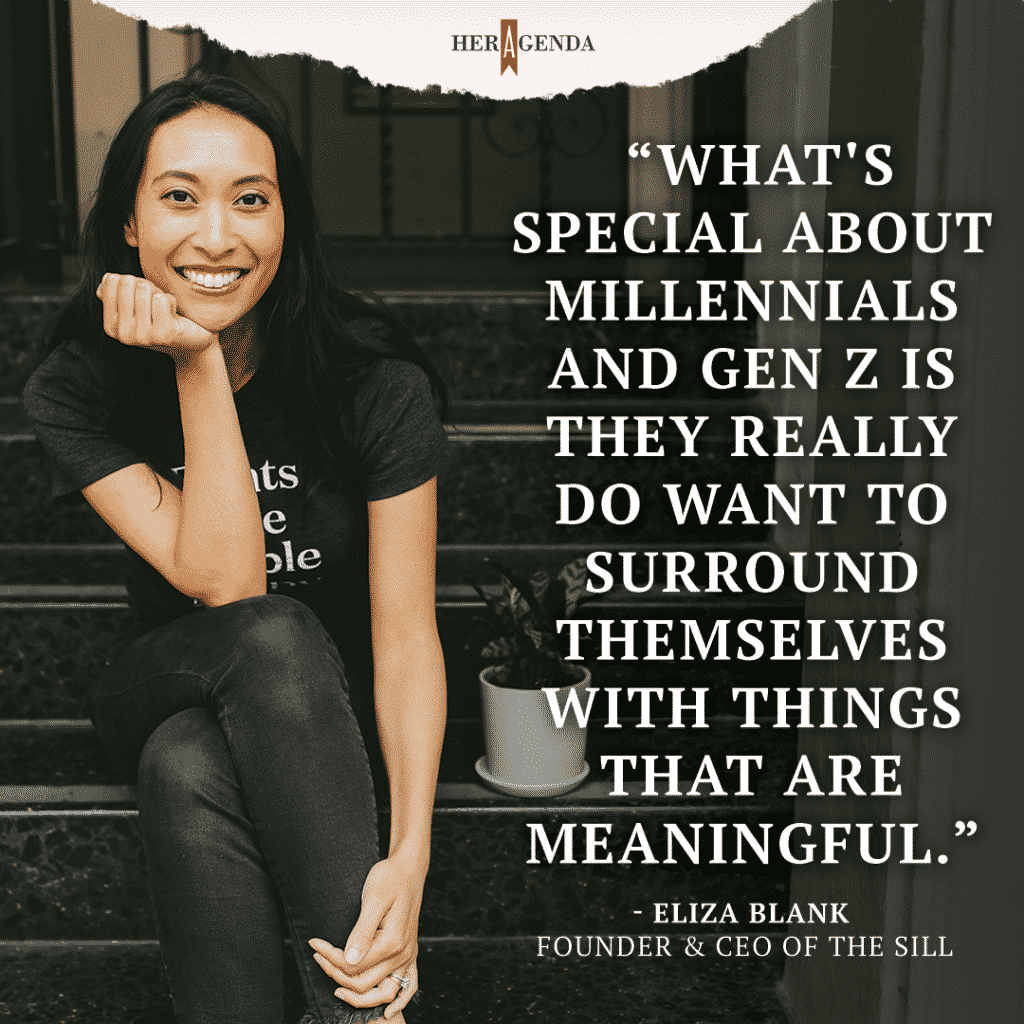
Her Agenda: Is there anything else you’ve been musing on that you’d like to share with our readers?
Eliza Blank: I encourage people to get to know the businesses they shop from, who’s really behind them, and how they’ve come to be. I think people have misconceptions about businesses, broadly speaking because they don’t put in the work. They sort of like skim the top of what they see available to them.
There are so many interesting ways to build a business and to be able to sort of vote with your dollar is a power that consumers have today that I think is at the forefront of our minds.
[Editor’s note: This interview has been edited for length and clarity.]

